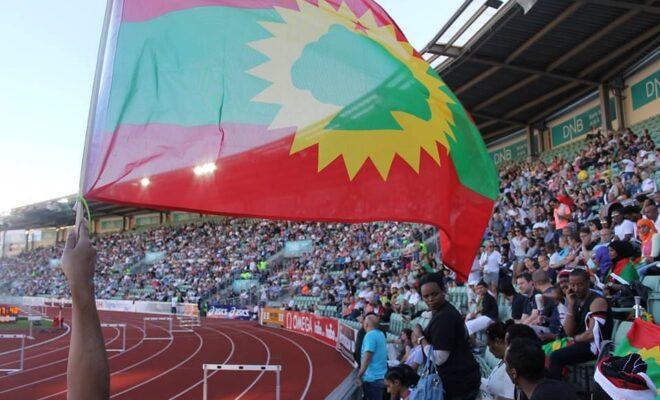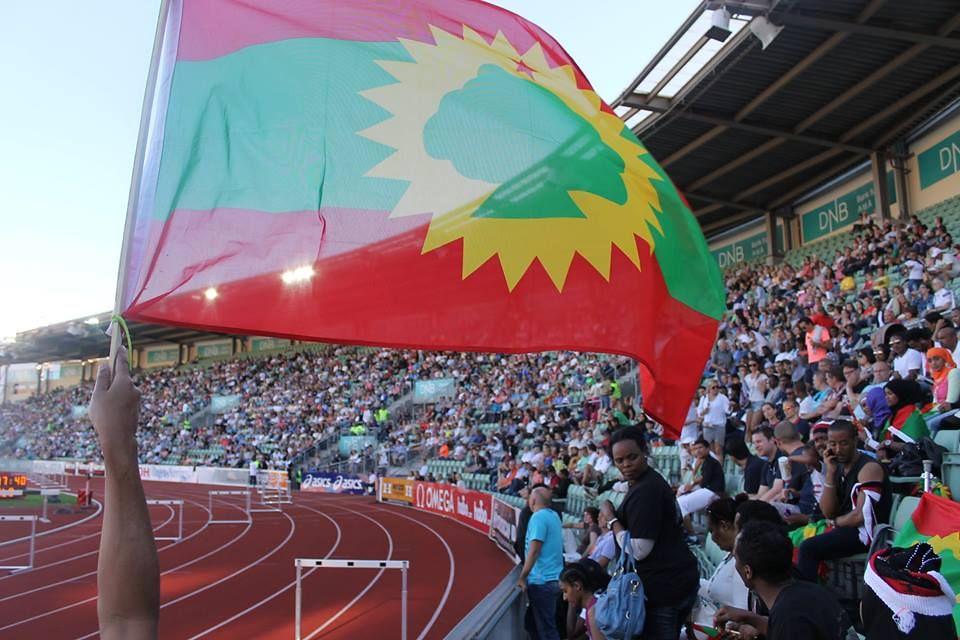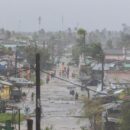“Ethiopia’s other conflict”: What’s driving the violence in Oromia?

The state has been pressured into talks in Tigray but not in Oromia, where a liberation movement complains of generations of subjugation.

A Oromo flag waves at a solidarity protest in 2014. Credit: Gadaa.com.
In November 2020, an outbreak of violence in Ethiopia’s Tigray region captured worldwide attention. The conflict was between Tigrayan forces and those of the Ethiopian government and its allies. Since then, Prime Minister Abiy Ahmed has been under increasing global pressure to negotiate with Tigrayan officials to stop the carnage.
Even before that fighting broke out, though, the government had established military command posts in another region: Oromia, Ethiopia’s largest, where Oromo people were protesting and calling for self-determination. In Oromia’s latest wave of violence in June 2022, several news outlets reported that hundreds of Amhara people had been killed by the Oromo Liberation Army (OLA) in the town of Wallaga.
The federal government and its allies, particularly Amhara elites and forces, blame the Oromo movement for the violence. This is a strategy to delegitimise the Oromo struggle for self-determination.
I’ve researched and written extensively on the Oromo movement, and identified the historical forces that have shaped its current politics. My understanding – taking into account the history of oppression of the Oromo in Ethiopia and numerous reports of attacks against the community – is that the violence in Oromia is mainly driven by the federal government and its agents. The Oromo Liberation Army is responding to state terrorism and gross human rights violations. Oromo voices are not represented in the Ethiopian government, the global system or the media.
A history of Oromo subjugation
Ethiopia’s approximately 115 million population is made up of about 80 ethno-national groups. The Oromo are the biggest. They make up a large minority – the government doesn’t provide exact data – and consider themselves a nation. The Amhara are the next largest, and their language, culture, history, religion, and leaders have dominated Ethiopia’s political economy for almost 150 years.
Despite their numbers, the Oromo consider themselves colonial subjects. This is because, like other subjugated ethno-national groups, they have been denied access to their country’s political, economic and cultural resources. Habasha (Amhara-Tigray) warlords colonised Oromia and incorporated it into Abyssinia in the late-19th century. Emperor Menelik II then established a form of colonialism that settled Amhara, Tigrayan and other ethnic soldiers in Oromia. Most Oromos were reduced to serfs, providing free labour and tax revenue. The colonial government claimed about three-quarters of Oromo lands for its officials and soldiers, granting the remaining quarter to Oromo collaborators.
In the 1970s, Oromo nationalists created the Oromo Liberation Front (OLF) to oppose the region’s political, economic and cultural marginalisation. Its military wing is the OLA. They wanted national self-determination and democracy, and participated in the failed revolutions of 1974, 1991, and 2018.
Through this era, the Ethiopian state has continued to subject the Oromo people to violence and human rights violations. Successive Ethiopian governments have caused deep social, political, cultural and economic crises in Oromo society.
Drivers of violence
The government and the OLF have blamed each other for the latest outbreak of violence in Oromia. This has particularly been the case in Wallaga, where a sub-group of the Oromo, the Macha, have been targets of the Ethiopian government and expansionist Amhara forces, who claim to be the original owners of the region. During the famine of the 1970s, desperate Tigrayans, Amharas and Oromos from elsewhere settled in Wallaga. Amhara expansionists began to call all these people Amharas to justify their claim to the territory.
Prime Minister Abiy Ahmed has taken the side of Amhara expansionists. He came to power in 2018 mainly because of the Oromo struggle, but later turned against the movement. His vision is of a centralised state rather than self-determination for Ethiopia’s different groups. His administration’s ideology of “Ethiopianism” has been used to justify the subordination of the Oromo and other colonised peoples. It has empowered the class that dominates the bureaucracy, army, culture, Orthodox Christianity, and Ethiopian colonial-political economy.
The OLA, which has been outlawed and labelled a terror group, says the government has created a clandestine security structure that masquerades as the Oromo army. It says this structure is responsible for the latest attack and those before it.
The conflict in Oromia has caused widespread misery. Between December 2018 and December 2019, government soldiers displaced 80,000 people and detained more than 10,000 in southern Oromia. An Amnesty International report found that state soldiers executed 52 people over this period on suspicion that they supported the OLA. The government additionally forced incarcerated Oromos to undergo months of mandatory training on the constitution and history in an attempt to make them abandon the quest for nationalism. A July 2022 Human Rights Watch report termed the government’s actions in western Oromia “abusive”. It documented communication shutdowns, executions and arbitrary detentions.
Way forward
Abiy’s government is willing to negotiate with Tigray forces mainly because of the pressure from global powers. Yet it refuses to reconcile with the OLF and is determined to solve a political problem militarily.
The global community must pressure the Ethiopian government to reach peace with the OLA too. However, this will only be successful if a neutral body mediates on behalf of the UN. Ethiopia cannot be at peace without an independent reconciliation body that solves the Oromo political problem fairly and democratically.![]()
This article is republished from The Conversation under a Creative Commons license. Read the original article.






Can’t Ethiopia at least live in harmony,put a side the long and past wicked history of oppression of this ethnic group by that ethnic group,live as a unified country and lead Africa by example just like it did the scramble and colonisation of Africa? Until when shall this grudge go on and on? from generation to generation is this how this great country going to be like this forever?
Why can’t intellectual like you create support for national reconciliation and truth and justice organisation with support from international community and put away this ugly scar once and for all?
Ethiopians should live together and should tolerate each other.
We hear always about this ethnic supremacist ideas comming from there it’s so sad even hear about assimilation, assimilation that our uneducated forefathers fought to liberate us for our liberty at 21 st century to hear of assimilation is total barbaric, this country is unique in its own God wanted it that
Kind create truth reconciliation justice and cohesion organisation bring everyone onboard there is nothing that can not be obtained if tried,I wish well for this great people and country Ethiopia the land of our forefathers
Zalaka from Kenya
Ethiopia’s other conflict: What’s driving the violence in Oromia?